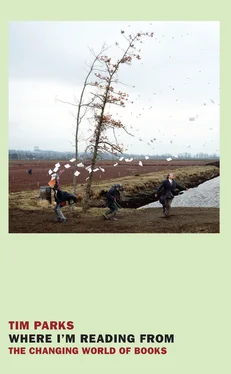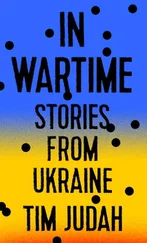Above all, the reviewer doesn’t consider the possibility that, in the presence of an urgent desire for change, as there clearly was for the characters he talks about in the earlier novels, the conviction that one can’t change might be, on the character’s part, and perhaps on the author’s too, a way of blocking oneself, preventing oneself from moving on, of finding excuses for inaction, or of ennobling pain (“I would like to change, but alas life is not like that”). It’s certainly a formula that allows for much drama and pathos.
This doesn’t mean, of course, that writers and the characters they create don’t genuinely hold this belief, or at least take it seriously. On the contrary, they have to take it seriously, otherwise they really would move toward change. Nor does it mean that there aren’t perhaps special reasons why readers would keep coming back to an author who believes change impossible; perhaps they themselves, like the author, have an investment in this position. Imagine discovering some unpublished work by Fitzgerald in which a Gatsby figure very easily recovers his lost love from her crass billionaire husband and sets up a happy home with her across the water from her ex. There was no real problem after all. Or a Faulkner novel where the suffocating paralysis of the Southern past just falls away following a smart if painful decision to move West, stop drinking, and accept the pleasures that a charming new lover is offering, someone entirely unimpressed by the torments of Yoknapatawpha County.
I want to put forward this provocation, not for the sake of stirring the water, but because I have begun to suspect it is true: most of our finest narratives, films as well as novels, however formally innovative and politically anti-establishment, are actually conservative, even inhibiting, in their consequences and implications. Shortly before writing The Return of the Native , Hardy copies down a paragraph from Heinrich Heine:
Modern times find themselves with an immense system of institutions, established facts, accredited dogmas, customs, rules, which have come to them from times not modern. In this system their life has to be carried forward; yet they have a sense that this system is not of their own creation, that it by no means corresponds exactly with the wants of their actual life, that, for them, it is customary, not rational. The awakening of this sense is the awakening of the modern spirit.
But he also jots down this warning remark from Theodore Watts:
Science tells us that, in the struggle for life, the surviving organism is not necessarily that which is absolutely the best in an ideal sense, though it must be that which is most in harmony with surrounding conditions.
He then goes on to write the first of a series of novels where all the “best” people are destroyed as their impulse toward self-realization collides with constricting conventions, economic hardship, and prejudice of every kind. This while Hardy himself struggled to remain in a marriage that was increasingly arid and continued to attend church regularly despite being an atheist.
Writers producing novels that follow this formula—and they are legion—are often praised for identifying and attacking the forces responsible for destroying their characters’ lives and denying them self-realization. They are considered progressive. Yet the question remains whether this message of the inevitability of defeat—“the time was not ripe for us,” says Hardy’s Jude , “our ideas were fifty years too soon”—is actually a form of consolation, a bid to improve self-esteem, or, more corrosively, an invitation not to try. It would surely make sense, after all, in a world that gives the maximum importance to individual emancipation but at the same time is so complex and interconnected as to be dependent on a certain uniformity of behavior, that we would develop narratives that flatter our individual “progressive” spirit but discourage us from acting on it.
What I’m trying to suggest here is, first: There are always reasons why an author (or simply a person) tells and keeps telling a certain kind of story, in a certain style, with a certain outcome. And I don’t just mean reasons that lie behind the story’s genesis, but also reasons that have to do with future consequences of seeing life this way; the story, and the conviction it carries, are part of the teller’s way of organizing his own life. Second: Readers are not neutral observers of this, not, I mean, engaged in savoring fine prose and well-structured narrative in a purely aesthetic way. However distant the actual plot may be from your experience, the story nevertheless intersects with your life: it can be reassuring, unnerving, boring, exciting, challenging, unbelievable; it can make you impatient; it can be helpful or unhelpful.
It’s precisely for this reason, precisely because of the power of narrative to shift or at least threaten our attitudes, to stymie us, that there are times when you might want to avoid certain books as unhelpful. Just as you don’t consult a pessimist when planning a major career move, so it would hardly be wise to give Chekhov’s short stories to the partner you have just proposed to. And you certainly don’t want to be reading Tess of the D’Urbervilles or Jude the Obscure while planning a family. Literature is not neutral.
Still, some writers do change their stories and their style quite decisively: Dickens shifted abruptly from optimism to pessimism, T.S. Eliot from a grumbling gloom to something approaching serenity, Joyce from relative simplicity to unspeakable complexity, Beckett from baroque English to the sparest French, Hardy from novels to poetry, or indeed, in the case of one of my favorite writers, Henry Green, from regular writing to silence. In each case, if one examines the life of the author, it becomes clear that the earlier approach no longer “worked” for the writer, no longer contained the tensions that need to be contained in order to go on living in a certain way. Some other story was necessary. Or alternatively, change had happened, had been achieved, for better or worse, and the previous story was simply no longer appropriate, because no longer required.
I recall in this regard a recent conversation with a young novelist who was in some distress about his private life, in particular his obviously conflicted behavior with women. I encouraged him to see an analyst and hopefully sort things out. He said he had thought about this but was concerned that a successful analysis would alter the way he wrote, his ability to write tense, distraught stories about conflicted behavior with women, etc. I laughed. When despair brings home the bacon and self-esteem with it, it’s hard to let it go. “When you are suffering enough,” I suggested, “I mean so much that it’s simply impossible to go on, then something will give and the stories will change, like it or not.”
So, to return to the reviewer of my novels: when a writer like myself, who has preached the inevitability of destiny and the impossibility of change for so long, begins to write rather different stories and look for new versions of events, you can feel free to assume that the old “narrative strategy” hasn’t delivered the desired results, or no longer delivers them. He’s no longer able to hold things together as they were by telling himself and the world there’s no other solution. The reader too, the faithful generous reader, who came back again and again to those unhappy tales and found sustenance in them, might take timely warning.
HOW FAR IS the trajectory of an author’s writing career and the themes that guide it related to the moment and nature of his or her death?
I have suggested that much great narrative writing springs from some unresolved conflict, or we might even say, structural dilemma in the author’s personality. Thomas Hardy yearns for the courage to be free but has been brought up as a feeble mother’s boy, constantly reminded of his frailty. All his life he will go back and forth between the adventure and freedom of London and the safety and constriction of his native Dorset; to London when confident, back to mother when in crisis (returns often preceded by a mystery illness). Frustrated in his marriage, Hardy writes of people who yearn to break society’s rules, above all be with the partner they desire, but are invariably destroyed when they actually try to do so, as if these novels were a message to himself not to risk it. Yet Hardy always stopped short of pushing personal problems to crisis, and when his wife died was well placed to marry his live-in secretary, almost forty years younger than himself. Never solving his dilemmas, but always finding some solution that avoided self-destruction, he lived to a ripe old eighty-seven.
Читать дальше












